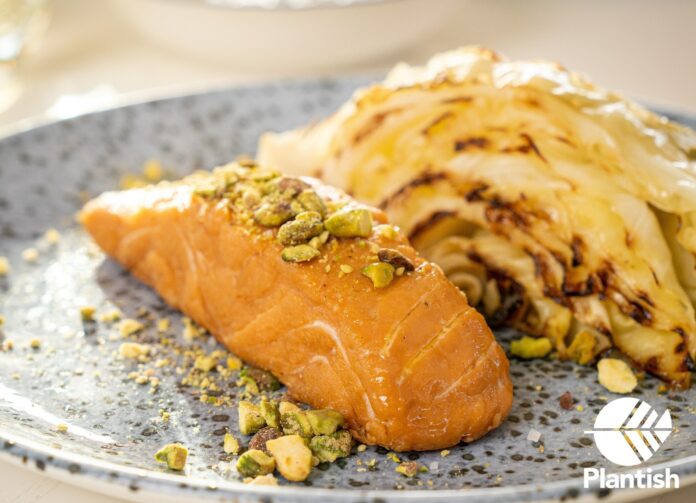
So far, the only company that specialised in developing plant-based fish using 3D printing technology was Vienna-based Revo Foods, formerly known as Legendary Vish. The potential of this market has raised the interest of another group of food scientists who founded Plantish.
The Israeli company is only a year old, but has already tackled the structure of the whole cut. Without giving too much details on its process, the startup is developing a patent-pending additive manufacturing technology to make plant-based fish alternatives at a low cost and at scale.
The company recently secured $12.45 million in seed funding, which is described as the largest seed round to date in the burgeoning alternative seafood market.
The round was led by State Of Mind Ventures, with participation from Pitango Health Tech, Unovis Capital, TechAviv Founder Partners, SmartAgro, E2JDJ, Alumni Ventures, and OurCrowd. The company had previously raised $2 million in pre-seed funding in June 2021, from TechAviv Founder Partners, a venture fund backed by top industry veterans, and angel investors including Chef José Andrés, and Nuseir Yassin from Nas Daily.
Like most companies that specialize in alternative 3D printed food, Plantish is driven by sustainability and ambitions to save the oceans through production of plant-based, whole-cut fish fillets that are similar in taste, texture, and nutrition to conventional fish.
“We’ve already seen it happen in the meat market, now it’s the time for fish,” says Ofek Ron, CEO and Co-Founder, “and in particular salmon, which accounts for $50 billion in the half a trillion dollar seafood market. The problem has been that fish is so difficult to replicate until now.”
Over 70% of conventional fish is consumed globally in whole-cut form, either as whole fish or fillets (Statista Fish & Seafood Report, 2021). However, the alternative seafood sector primarily consists of minced fish options, such as fish fingers and fried fish, due to the technical complexities of whole-cut production.
To address these technical complexities, Plantish first deconstructed salmon to understand its different components. Today, the company’s team can create plant-based connective tissue and muscle tissue, one super-fine layer at a time using its AM technique.
Their first product is Plantish salmon™, which mimics cooked salmon in taste, texture, appearance, and structure, whilst also having the same nutritional values as its conventional counterpart, with high protein and Omega-3 content. Plantish’s current prototype can be prepared and cooked in all the methods that conventional salmon is prepared, the company explains.
The new funds will go towards building out the team and conducting further R&D to accelerate product development, with the goal being to get into foodservice first. Ron explained, “We understand that over 60% of seafood is eaten outside the home, and salmon is among the most popular fish and animal protein in the world. Therefore we are focusing our efforts on the foodservice route and you can expect to see us in fine dining restaurants within the next two years.”
Remember, you can post job opportunities in the AM Industry on 3D ADEPT Media free of charge or look for a job via our job board. Make sure to follow us on our social networks and subscribe to our weekly newsletter : Facebook, Twitter, LinkedIn & Instagram ! If you want to be featured in the next issue of our digital magazine or if you hear a story that needs to be heard, make sure to send it to contact@3dadept.com





